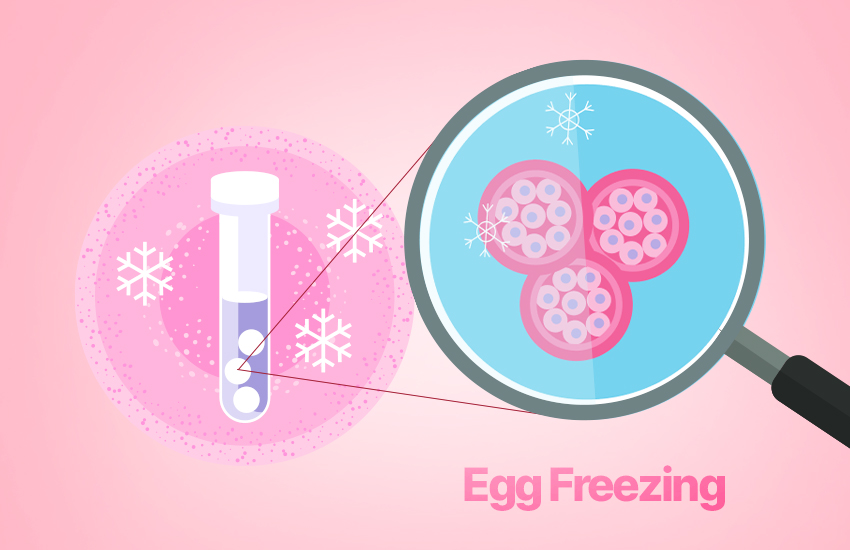Preserving Fertility: Everything You Need to Know About Egg Freezing

With increased focus on career and personal goals in today’s world, fertility preservation has become a vital option for individuals and couples seeking to delay parenthood. The medical advancement of egg freezing is a viable and easy option for preserving reproductive potential.
But how do you decide it is suitable for you and when can this procedure be done? In this blog, you will get deeper insights and the key details about egg freezing, how it is done and whom it is suitable for.
What is Egg Freezing?
- Egg freezing, also known as oocyte cryopreservation, involves extracting, freezing, and storing a woman’s eggs to preserve her reproductive potential.
- By freezing eggs at a younger age when they are most viable, women can preserve their fertility against the dual challenges of age-related decline and low Anti-Müllerian Hormone (AMH) levels.
- This procedure empowers women with the flexibility to pursue their career and personal goals without sacrificing their future chances of motherhood.
How is Egg Freezing done?
- The egg freezing process begins with an assessment of ovarian reserve through blood tests and a pelvic ultrasound to estimate the potential number of oocytes and determine medication dosage.
- Ovarian stimulation follows, similar to in vitro fertilisation (IVF), using injectable hormonal medications.
- Oocyte retrieval is followed where oocytes and surrounding fluids are aspirated vaginally under sedation.
- Finally, cryopreservation of the mature eggs is done using vitrification, a method involving ultra-rapid cooling into liquid nitrogen for long-term storage.
Who is it for?
- Medical indications for egg freezing include women undergoing cancer treatment, such as chemotherapy or radiation, which can damage the ovaries.
- Women facing surgery that could harm ovarian function.
- Women at risk of premature ovarian failure.
What is the ideal age for egg freezing?
The best time to freeze eggs is in the early to mid-30s, as fertility begins to decline after the age of 35.
What are the benefits of egg freezing?
- It provides flexibility for women who wish to delay childbirth and are not ready to start a family.
- It gives women control over their reproductive future, allowing them to make decisions that align with their long-term goals.
- It helps alleviate the pressure of biological clocks.
How will these Eggs be Used?
- When a woman decides to use her frozen eggs, they are thawed and assessed. Surviving eggs are fertilized via intracytoplasmic sperm injection (ICSI), where a single sperm is injected into the egg.
- The resulting embryos are cultured for 3-5 days before being transferred into the uterus to achieve pregnancy.
What are the Chances of a Successful Pregnancy?
Clinical pregnancy rates usually range between 4-12% per oocyte, though more data is needed. Success depends largely on the woman’s age at the time of freezing and the number of available eggs.
Are There Effects on the Offspring Conceived from Frozen-thawed Oocytes?
Studies have not shown an increased risk of congenital anomalies in children born from frozen-thawed oocytes compared to those from fresh oocytes, but more long-term data is needed.
What are the Risks Associated with the Oocyte Cryopreservation Procedure?
The risks are similar to those of ovarian stimulation for IVF, including a small chance of ovarian hyperstimulation syndrome, infection, and bleeding during egg retrieval.
How Long Can the Eggs Be Stored?
Eggs can be stored for extended periods without adverse effects, though data is currently limited to up to 4 years.
It’s important to note that older maternal age can increase the risks of pregnancy complications. Most clinics have an upper age limit for using stored eggs.
Conclusion
It is imperative to create widespread awareness among women about the impact of age and low AMH levels on fertility, as well as the potential of egg freezing as a proactive measure.
Empowering women with this knowledge will enable them to make informed decisions about their reproductive health, preserving their chances for future motherhood.
At Fyne IVF, we offer egg freezing options to help individuals and couples preserve their fertility. Our expert team provides personalized consultations to help you make the best choice based on your unique needs and future fertility goals.